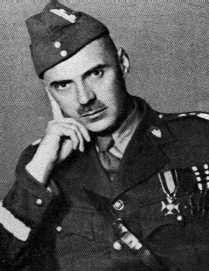|
|
  |
|
|  | | |
Władysław Anders was born on 11 August 1892 in Blonie. in the neighbourhood of Kutno city. He was the son of Albert, the administrator of property of Krośniewice. The family, from generations polonized, came from Inflants. After graduating from the Warsaw School of Real, he studied at Technical University in Riga. Appointed to the Russian army Władysław held service at the cavalry reserve officers school. To the war in 1914 he left as a first lieutenant of dragoons. He commanded a squadron and later a unit. He was wounded three times and received the Cross of St. George for bravery.
Before the outbreak of the revolution, he managed to complete a course at General Staff Academy in Saint Petersburg.

He joined the Polish army right after the creation of I Polish Corps in Belarus. He took part in the formation of I Regiment of Krechowieckich Lancers, after that he was the chief of staff of the 1st Rifle.
After capitulation of Polish Corps to the Germans he came to the country. When in January 1919, general Dowbór-Muśnicki became a commander of Army Wielkopolska, Lt. Col. Anders became the Chief of Staff and later was the founder and commander of 15 Regiment of Lancers in Poznan. After finishing of battles in Wielkopolska he led this regiment to take part in the War of 1920.
In years 1921-1923 he graduated from the Paris Ecole Superieure de Gurre, then was promoted to colonel qualified.
In 1925 he commanded Polish equestrian team, which received the Cup of Nations in the international competition in Nice.
In November 1925, after a demonstration of legion officers he became the Commander of Warsaw and in the days of the attacks in May 1926 he was the chief of staff of the commander of government troops, Gen. Rozwadowski. He also escorted President Wojciechowski and Witos to Wilanow.
In spite of this, he was allowed to stay in country service, receiving one and a half years later Wolyńska Cavalry Brigade commander . On January 1, 1943 he was promoted to brigadier general. In 1937 became the commander of the Cavalry Nowogrodzka Group, which went to war in 1939. In mid-September he took command of the Cavalry Operational Group; 29 September, several times wounded, was interned in Turka by the Soviet army.

Released after the Polish-Soviet agreement of July 30, 1941 he was appointed in August, by General Sikorski, the commander of Polish forces formed in the USSR and at the same time he was promoted to the rank of Major- General.
After leaving the Soviet Union by the forces to the Middle East he became the commander of the Polish Army in the East and in August 1943 he became the commander of 2nd Polish Corps, constituted from the Polish Army.
He commanded those forces during the Italian campaign until the conquest of Bolonia in April 1945, fulfilling, at the same time from 26 February 1945, the duties of the Leading Commander because General Bor-Komorowski was imprisoned by Germans. This function was transferred back to General Bor-Komorowski in May 1945 just before the July 6, 1945, when the western countries refused to recognize the Polish government in London.
General Władysław Anders was a political commander of military groups in exile.
He died on 12 May, 1970.
|
| |  | ::... | |
|  |  |
|
|